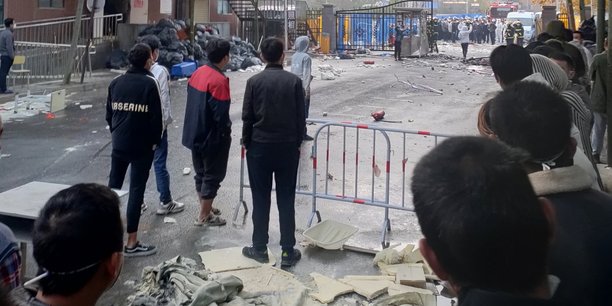This could upset Apple, as the end of the year celebrations and their traditional Christmas gifts are approaching. It may, in fact, be hard to find an iPhone under the tree. At issue are the demonstrations that erupted this week inside the Foxconn factory in Zhengzhou in China. On Wednesday, men armed with batons broke CCTV cameras and windows at the sprawling Foxconn campus in Zhengzhou. They protest against the ultra-strict measures to limit the spread of Covid-19 to which the site has been subjected since it experienced an increase in contamination. In early November, the establishment of a “health bubble” between the dormitories and the factory was thus announced. In addition, the employees who continue to work are grouped into three dormitories.
Protesters also reacted to the announcement of delays in paying wages to factory employees. The workers have in fact indicated on social networks that they have been informed that Foxconn intends to delay the payment of bonuses.
In an effort to calm the social unrest, management apologized to factory staff on Thursday. ” Our team investigated the matter and realized that a technical error had occurred during the recruitment process.”Foxconn wrote in a statement, referring to the hiring of new employees. “We apologize for this error in the computer system and we guarantee that the salary paid will be equal to the agreed one”he assured.
On the same day, the largest protests subsided on Thursday and the company entered discussions with employees, according to a Foxconn source familiar with the situation. According to her, Foxconn even found “preliminary agreements” with the workers to resolve the dispute and continue production. For its part, Apple said it has employees on site and that the company “was working closely with Foxconn to ensure workers’ concerns were addressed”.
At least 30% drop in production for Apple
For the American giant, this social movement translates into a drastic drop in production within its main iPhone assembler. It could fall by at least 30% in November, according to a source cited by Reuters. This estimate is higher than projections from the company, which internally estimated last month that production of these smartphones could decline by 30% in November, said the source, who preferred to remain anonymous due to the private status of this information. He added that after protests erupted at the factory site this week, it was ” impossible “ production will fully resume by the end of the month as planned by the company. Foxconn declined to comment on this information.
In early November, the announcement of sanitary restriction measures due to the increase in Covid-19 contamination had already led to a drop in production. The Taiwanese group had thus announced that it expected worse results than expected for the end of the year and assured “to work now with the authorities in a joint effort against the pandemic, in order to resume production at full capacity as quickly as possible”.
20,000 workers flee
But this is without counting the demonstrations that have broken out. Especially since more than 20,000 factory employees left the site this Friday. Most of them had been recruited recently and had not yet started working on the production lines, according to information from Reuters. This could further complicate the goals of a full recovery of activity by the end of November. Videos posted on social networks on Friday also show many workers waiting to board the buses. ” It’s time to go home”said one such person who posted a video. A second source within the Taiwanese company confirmed the departures, without however providing a figure, and explained that they would not affect production, as new hires must undergo training before starting work.
In an effort to avoid running out of smartphones, Apple is gradually moving away from China in favor of India. To avoid being subject to these confinements, the tech giant intends to quickly start production of the iPhone 14 in this country. This relocation constitutes a change in the industrial strategy of iPhone, which has chosen to distort its value chain; labor is cheaper in China. Nearly 7.5 million iPhones – or 3% of Apple’s annual production – thus left Indian factories last year.
(with Reuters)


